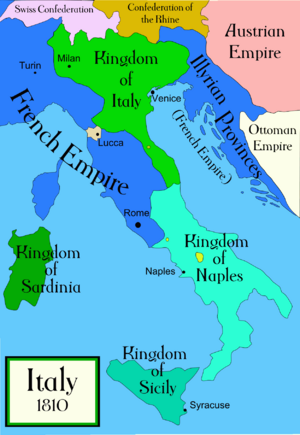Siege of Ancona facts for kids
Quick facts for kids Siege of Ancona |
|||||||
|---|---|---|---|---|---|---|---|
| Part of the Neapolitan War | |||||||
 Political map of Italy in the years around 1810 |
|||||||
|
|||||||
| Belligerents | |||||||
| Commanders and leaders | |||||||
| Menrad Freiherr von Geppert | Baron Monte Majo | ||||||
| Strength | |||||||
| 2,300 | 1,500 | ||||||
| Casualties and losses | |||||||
| Light | 500 killed or wounded 1,000 captured |
||||||
The Siege of Ancona was an important battle during the Neapolitan War. This war happened in Italy. The siege started on May 5, 1815, and ended on May 30, 1815. It happened just after another big battle called the Battle of Tolentino.
The Siege of Ancona was one of the last fights in Italy during the Neapolitan War. The city of Ancona was the last major city in Italy to give up. The battle was between soldiers loyal to Napoleon in Ancona and an alliance of British and Austrian forces. This happened during a period known as the "One Hundred Days" campaign. The British and Austrian alliance won. This victory helped push the French out of Eastern Italy. It also stopped a plan to set up a new royal family (the Bonaparte family) in Italy. After the siege, the Papal States took control of the area.
The Battle of Ancona
On May 5, 1815, an Austrian army began to surround Ancona. This army was led by Major General Menrad Freiherr von Geppert. The combined British and Austrian forces had about 2,300 soldiers.
Ancona was defended by 1,500 soldiers who supported Napoleon. These soldiers were part of a group that had fought in the Battle of Tolentino just days before. The British and Austrian forces attacked the city with cannons. About 500 of Napoleon's soldiers were killed or hurt. Finally, on May 30, the city surrendered.
What Happened Next
The Siege of Ancona confirmed that Napoleon's forces had lost control in Italy. Ancona was the last big Italian city to surrender to the Austrians. This battle happened shortly before Napoleon's final defeat at the Battle of Waterloo.
After the French were forced out, there was no clear ruler in Italy. This situation is called a "power vacuum." Italians did not want anyone who supported Napoleon to be in charge. Joachim Murat, a prince who supported Napoleon, wanted to unite Italy. He tried to create a new monarchy (a government led by a king or queen) from his family. However, people did not like Napoleon, so Murat's plan failed.
The British removed Murat's family from power in Naples on May 30, 1815. This was the same day the Siege of Ancona ended. Murat had already been defeated by the Austrians on May 3, 1815. This meant that a new constitution (a set of rules for the government) he had suggested never happened. But his ideas for an independent Italy were important later. They helped inspire the Risorgimento, which was a movement to unite Italy many years later.
After the Siege of Ancona, the Papal States gained power in Italy. The Papal States were led by the Pope. They wanted to keep things traditional and supported Austrian influence. They were against revolutions and the idea of uniting Italy. Because of this, the Papal States slowed down the unification of Italy for many years. Their rule lasted until 1848.
 | Kyle Baker |
 | Joseph Yoakum |
 | Laura Wheeler Waring |
 | Henry Ossawa Tanner |

